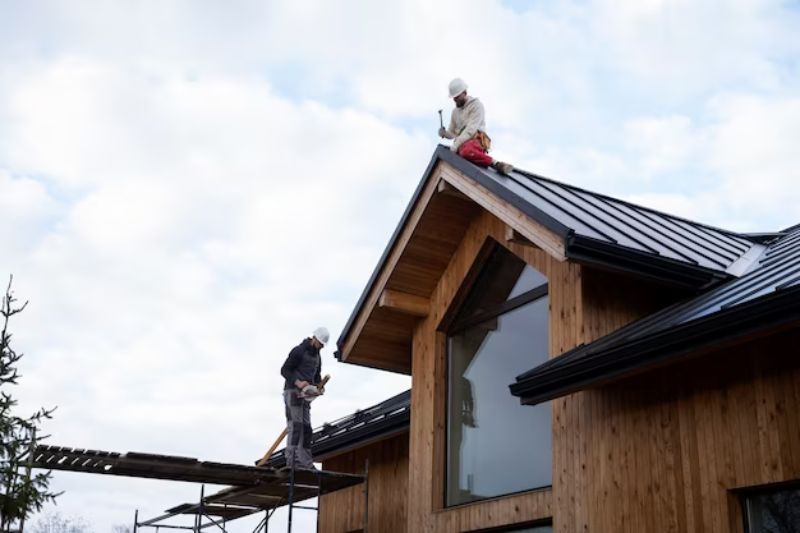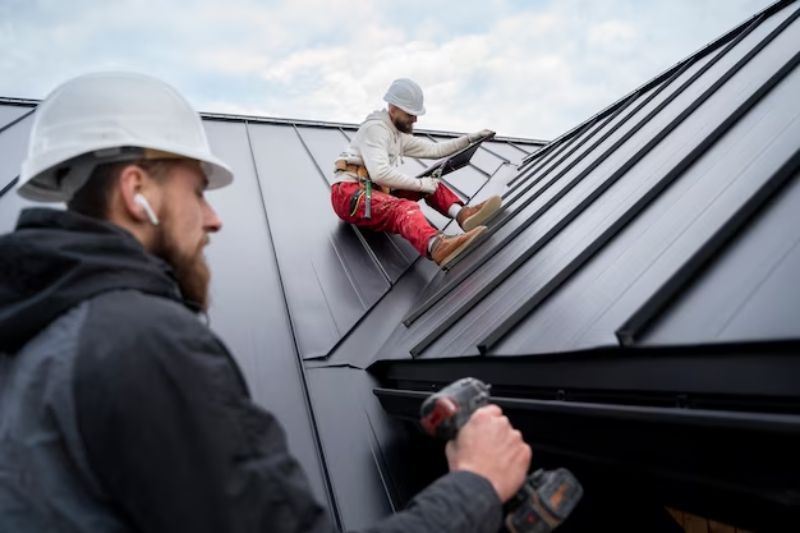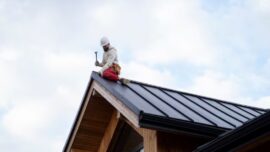
Comparing Residential Roofing Services: DIY vs. Professional Services
A well-maintained roof is a fundamental component of any home, safeguarding it from the elements and ensuring the comfort and safety of its inhabitants. When it comes to maintaining or repairing residential roofs, homeowners face a crucial decision: should they undertake the task themselves, or should they opt for professional residential roofing services?
In this blog post, we’ll delve into this dilemma, weighing the pros and cons of DIY roofing against the advantages of hiring a professional. We aim to equip you with the knowledge and insights necessary to make an informed choice and ensure your home’s roof stands strong in the face of nature’s challenges.
DIY Residential Roofing Services
Undertaking DIY residential roofing can be a rewarding endeavor, but it’s essential to weigh the pros and cons before diving in. Here, we’ll explore the advantages and disadvantages of DIY roofing, along with key considerations to ensure a successful project.
Pros of DIY Roofing:
- Cost Savings — One significant advantage of tackling your roofing project yourself is the potential for cost savings. By eliminating labor costs, you can significantly reduce the overall expenses associated with roof repair or replacement.
- Sense of Accomplishment — DIY roofing can provide a strong sense of accomplishment. Finishing a roofing project on your own can boost your confidence and satisfaction, knowing that you’ve contributed to your home’s well-being.
- Flexibility in Scheduling — When you take on a DIY roofing project, you have the freedom to work on your own schedule. This flexibility allows you to plan the project around your availability and avoid potential delays.
Cons of DIY Roofing:
- Safety Risks — Working on a roof poses significant safety risks, especially for those without proper training and equipment. Falls and injuries are common in DIY roofing, making it a hazardous endeavor.
- Lack of Expertise — Roofing requires specific skills and knowledge. DIYers may lack the expertise needed to address hidden issues or install roofing materials correctly, potentially leading to more problems down the line.
- Potential for Mistakes and Future Issues — Inexperienced roofers are more likely to make mistakes, such as improper installation or inadequate repairs, which can result in costly issues and the need for professional assistance in the future.
Considerations for DIY roofing:
- Roof Inspection: Begin by thoroughly inspecting your roof to assess the extent of the damage or the need for replacement. Identifying underlying issues is crucial before starting any DIY roofing project.
- Necessary Tools and Materials: Ensure you have the appropriate tools and high-quality roofing materials. Using subpar materials or inadequate tools can lead to a poor-quality roof that won’t withstand the elements.
- Safety Precautions: Prioritize safety by investing in proper safety gear and equipment. Additionally, follow safety guidelines, work with a partner if possible, and be cautious when navigating the roof to prevent accidents. If in doubt, consider consulting professional residential roofing services for guidance.
Professional Residential Roofing Services
Professional residential roofing services offer a range of advantages, but they are not without their drawbacks. Whether you’re considering a roof repair, replacement, or a new installation, understanding the pros and cons of hiring a professional is essential.
Pros of Professional Roofing Services:
- Expertise and Experience — Professional roofers typically have years of experience and training in the field. They understand the nuances of various roofing materials and designs. Their expertise ensures a job well done and minimizes the risk of errors.
- Quality Materials and Workmanship — Professional roofers have access to high-quality roofing materials that might not be available to the average homeowner. This results in a more durable and long-lasting roof. Additionally, their workmanship is often of a higher standard, which contributes to the longevity of the roof.
- Safety and Insurance — Roofing is a dangerous job, and professionals are equipped with the necessary safety gear and protocols. In the event of accidents or damage during the project, professional roofers are typically insured, which provides peace of mind for both the homeowner and the workers.
Cons of Professional Roofing Services:
- Higher Cost — One of the most significant drawbacks is the cost. Professional residential roofing services can be expensive compared to DIY projects or hiring less-experienced contractors. However, the quality and longevity of the work often justify the higher investment.
- Limited Control Over the Process — When you hire professionals, you relinquish some control over the project. You must trust their expertise and decisions, which may not align with your preferences in terms of aesthetics or design.
- Scheduling Constraints — Professional roofing companies often have tight schedules. This can lead to delays in starting or completing your roofing project, which can be frustrating, especially if you have time constraints.
Considerations for Hiring a Professional:
- Researching and Choosing the Right Contractor — Take time to research and opt for a reputable roofing contractor. Check their qualifications, certifications, and reputation. Reading customer reviews and obtaining recommendations from friends and neighbors can help you find a reliable professional.
- Getting Multiple Quotes — To guarantee a fair price for your roofing project, obtain multiple quotes from different contractors. This not only helps you compare costs but also gives you insights into the various services and materials offered by different professionals.
- Contracts and Warranties — Before starting the project, make sure to have a written contract in place. The contract should detail the scope of work, payment terms, and project timeline. Additionally, ask about warranties on both materials and workmanship to protect your investment in the long run.
Residential Roofing Projects Suitable for DIY

When it comes to residential roofing, there are several projects that are suitable for a DIY approach. These projects can help you maintain your roof’s integrity and extend its lifespan. Here are three key areas where you can take a DIY approach:
- Minor Roof Repairs – Minor roof repairs, such as fixing small leaks, replacing damaged shingles, or sealing cracks, can often be tackled by homeowners. You’ll need some basic roofing tools and materials, but with the right instructions, you can address these issues to prevent them from escalating.
- Gutter Cleaning and Maintenance — Keeping your gutters clean and well-maintained is crucial for the overall health of your roof. Regular gutter cleaning and simple maintenance tasks like reattaching loose brackets or sealing leaks can be done by homeowners. This not only helps prevent water damage but also maintains the structural integrity of your roof.
- Routine Roof Inspections — Regular inspections are essential to catch potential issues early. With some guidance, homeowners can perform routine roof inspections to identify issues like loose or missing shingles, damaged flashing, or signs of wear and tear. This proactive way can save you money in the long run by addressing problems before they become major repairs.
Roofing Projects Requiring Professional Services
Certain roofing projects are best left to the professionals due to their complexity and safety considerations. Here are three types of roofing projects that require the expertise of professional roofing services:
- Roof Replacements — When your roof has achieved the end of its lifespan or incurred extensive damage, a full roof replacement is necessary. This is a complex project that involves removing the old roof, addressing any underlying issues, and installing a new roof system. Professional roofers have the experience, equipment, and knowledge to ensure a proper and durable replacement, which is crucial for your home’s protection and longevity.
- Extensive Repairs — Some roofing issues, such as significant structural damage or widespread leaks, require extensive repairs that go beyond simple DIY fixes. Professional residential roofing services can accurately assess the damage, provide the right materials, and execute repairs that meet industry standards. Attempting these repairs without experience can lead to further damage or pose safety risks.
- Complex Roof Designs — Complex roof designs require specialized skills and equipment for installation or repairs to ensure the roof’s performance and appearance are maintained. Professional residential roofing services, certified by the National Roofing Contractors Association (NRCA), have the expertise to work on intricate or unconventional roof designs such as steep slopes, dormers, or multiple angles.
When to Combine DIY and Professional Services
Combining DIY and professional residential roofing services can be an effective approach for various home improvement and repair projects. Two common scenarios where this collaboration works well are:
- Collaborative Projects — In many cases, homeowners can collaborate with professionals on larger projects. For example, when renovating a home, homeowners might handle interior design, painting, or minor carpentry as DIY tasks, while leaving structural, electrical, or plumbing work to qualified professionals. This collaborative approach optimizes cost-efficiency and ensures that specialized tasks are completed by experts.
- Staged Repairs and Improvements — Homeowners can also benefit from staging repairs and improvements. They can address simpler tasks themselves, such as repainting, basic landscaping, or minor roof repairs. For more complex tasks, like foundation repair, HVAC installation, or roof replacements, professional residential roofing services are essential. This staged approach allows homeowners to manage costs and make incremental progress in enhancing their homes.
Residential Roofing Services FAQs
What is the definition of roofing in construction?
In construction, roofing refers to the process of installing a protective covering on the top of a building or structure. This covering is designed to create a weatherproof barrier that shields the building’s interior from precipitation, direct sunlight, and other environmental elements. The choice of roofing materials and techniques can vary contingent on factors such as local climate, architectural style, and budget.
What type of roof is best for a tropical climate?
In a tropical climate, the most suitable roofing materials are those that can endure high temperatures, heavy rainfall, and potential tropical storms. Metal roofs, such as galvanized steel or aluminum, are often recommended for their durability and resistance to extreme weather conditions. Proper insulation and ventilation are also essential to maintain a comfortable indoor environment.
Which type of roof is the most durable roof?
The most durable roofing materials include metal roofs, such as steel or aluminum, and concrete or clay tile roofs. These materials are renowned for their longevity and ability to withstand harsh weather conditions. It’s important to note that the durability of any roofing system also depends on proper installation and ongoing maintenance.
Conclusion
The choice between DIY and professional residential roofing services is a decision that holds significant implications for your home’s well-being. Safety, long-term durability, and cost-effectiveness are all factors that weigh into this choice. We encourage homeowners to thoroughly assess their specific roofing needs and consider the trade-offs of each option. Making an informed decision ensures that your home’s shelter remains steadfast. For all your roofing needs, contact us at Covenant Roofing.





